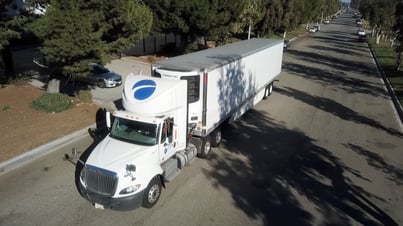In our last blog post, we examined some of the characteristics you should look for in a refrigerated truck carrier – specifically one that specializes in candy and snack products. In this article, we’ll drill down a step further and discuss what you need to look for in refrigerated LTL carriers, particularly those that operate on the West Coast. While most of these characteristics are the same across the country, there are a few West-Coast-specific items to keep an eye on.
Finding the right refrigerated LTL carrier for your operation
 1. Look for capabilities within your product temperature zone. At the risk of stating the obvious, “refrigerated” can refer to several different temperature zones. You will need to make sure your chosen carrier can handle your product’s specific temperature range. For refrigerated LTL carriers on the West Coast, there are many that handle frozen, chilled or both.
1. Look for capabilities within your product temperature zone. At the risk of stating the obvious, “refrigerated” can refer to several different temperature zones. You will need to make sure your chosen carrier can handle your product’s specific temperature range. For refrigerated LTL carriers on the West Coast, there are many that handle frozen, chilled or both.
2. Look for a provider that has experience with your product type. Once you are comfortable with your carrier’s ability to keep your products’ temperature within range, you’ll want to know that it has experience carrying your specific type of product. After all, shipping packaged products (e.g., confectionery products) requires a different skill set than fresh produce. References from other customers within your industry are invaluable in this regard.
3. Ensure that your carrier can keep your products segregated. One of the biggest challenges shippers face with refrigerated LTL is keeping products segregated to avoid cross contamination – particularly odor-related cross contamination.
If your product is “sharing the ride” in an LTL reefer trailer with other food products such as onions, coffee, fish or pepper, your products could absorb the odors of those other products. Even packaged products can be affected by these scents. You want to make sure that your carrier can segregate products appropriately to prevent this from happening. This entails adequate separation within the trailer or carrying offending products on separate trailers.
Importantly, the culprits also include non-food products. The smell of various rubber products, for instance, will attach itself to virtually any product in the same trailer.
There is also the issue of hazmat. There are several types of hazardous products that require refrigerated transportation. These products can share the ride with food products in an LTL trailer just like any other type of temp-controlled product. In most cases, there is nothing illegal about such an arrangement, provided that all safety requirements are met. It is unlikely, however, that carriers that choose to ship food-grade products alongside hazmat will obtain certification from food-grade certification agencies such as AIB International.
Legality is one thing; the risk of accidents and bad optics are another. Understandably, most food companies will not want their products shipped alongside hazmat under any circumstances. Some grocery consignees won’t even accept food products that arrive on a trailer with hazmat placards.
The bottom line for all the above scenarios is straightforward: determine the types of products you do not want your products sharing a trailer with, and find a carrier that will honor your wishes.
4. Weigh the pros and cons of multi-temp trailers. Modern transportation technology affords carriers the ability to ship different products with different temperature requirements in the same trailer. For instance, a refrigerated LTL carrier may store frozen food products in a bulkhead at the front of the trailer, while storing deli products farther back.
With truckload shipments heading from point A to point B, such multi-temp shipping is usually safe and effective. Temperatures are maintained in each zone and there is little risk of temperature degradation.
With refrigerated LTL transport, on the other hand, there are usually several stops that need to be made to different distribution centers. Every time a stop is made, trailer doors are opened and refrigerated air is allowed to escape. Once this happens 3 or 4 times, there is a high likelihood that enough refrigerated air will escape to make the temperature of each zone rise. And, as zone temps rise, there is a higher risk of your product falling out of its desired temperature range.
If your prospective LTL carrier uses multi-temp trailers, this is an important concern to discuss before entrusting your goods.
5. Consider air freight. California airports are common destinations for refrigerated air freight shipments. If these shipments are a part of your supply chain mix, you’ll need to partner with a refrigerated LTL carrier that can receive your freight at the airports’ air cargo centers and get it on the road. Some refrigerated LTL carriers on the West Coast are very adept at this and routinely perform these services.
Partner with a 3PL for refrigerated LTL carrier service on the West Coast
West Coast trucking – no matter what form it takes – is not for the faint of heart. It’s a complex operation that requires expert navigation of congested roadways and even more congested California ports. It’s also an operation that relies increasingly on compliance – with retailer RAD, with the FSMA, and with the myriad laws and regulations unique to California logistics.
To run this operation successfully, you need a true third-party logistics (3PL) partner that truly walks the walk when it comes to compliance. Weber Logistics is one such California 3PL. And, with a fully integrated approach that also includes drayage and warehousing, we walk the walk in all areas of the supply chain. To learn more about our refrigerated LTL operation – and our many other West Coast 3PL services – contact us today.






 Capital Management
Capital Management